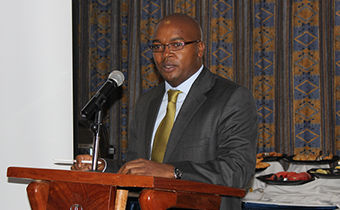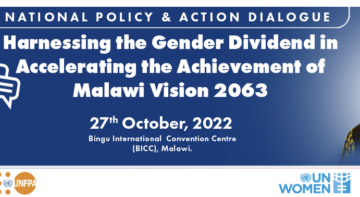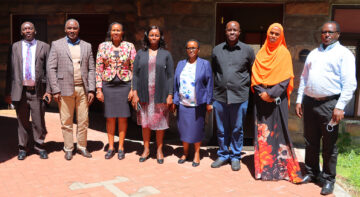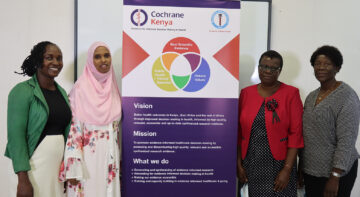Blogs

In a breakfast meeting at the Panafric Hotel in Nairobi today, AFIDEP, under its SECURE Health programme, led the deliberation of findings of a needs assessment that has focused on understanding the barriers and opportunities for strengthening research use in decision-making in the health sector in Kenya. The meeting, which was officiated by Kenya’s Director of Medical Services (DMS), Dr. Nicholas Muraguri, attracted senior officials from the Ministry of Health, Parliament, WHO country office, UNICEF country office, and SECURE Health partner institutions including the Consortium for National Health Research (CNHR) and FHI 360.
In his keynote address which focused on ways in which the Ministry will address the barriers to research use, Dr. Muraguri pointed out that every year, a lot of research evidence is generated from various quarters, but very little of this gets to inform decision-making in the health sector in Kenya. To address this challenge, Dr. Muraguri, came into office in the last month, said that he will form DMS advisory teams that would, every year, synthesize emerging research evidence on the different health policy issues and advise him on the policy options that the Ministry needs to take to in order to tackle the issues.
Clearly an ardent champion of research utilisation, Dr. Muraguri went on to say that the Ministry of Health will, in the coming months, review how it conducts business starting with assessing the impact of its current policies such as the free maternity services policy. He said this assessment will seek to answer critical questions such as: “is this the best value for Kshs. 4 billion every year? How effective is the implementation of the free maternity services?”
Further, Dr. Muraguri committed to reviving the library at the Ministry of Health. Speaking on the importance of a library in ensuring that evidence is considered in drafting policy propositions, he said, “Our staff need to be well-informed. They need to read and have their facts right.” He further noted that his focus will be on ensuring that senior officials within the Ministry are focusing on research and inculcating a culture of reading and research use within their departments.
Acclaiming the work that the SECURE Health programme is undertaking, Dr. Muraguri declared that during his tenure, he wants to reposition the Ministry of Health as a place where the best brains in the health sector work. A major ask was for the SECURE Health team to facilitate Ministry staff in utilising Demographic Health Survey (DHS) data to inform policy. “Staff need to learn how to develop [good] policy briefs.” Commenting further on the need to enhance the capacity of policymakers, he pointed that policymakers should utilise research evidence in order to improve healthcare in the country.
In addition, the DMS emphasised the need to cultivate a knowledge-sharing culture among policymakers and researchers. This will be further strengthened by the establishment of a health observatory. A one-stop shop for all health research evidence produced in the country.
The bottlenecks to accessing research evidence
Presenting on the findings of the needs assessment, Dr. Rose Oronje (Senior Policy and Communications Specialist, AFIDEP) highlighted some of the key barriers to access and use of research evidence by health policymakers in Kenya. Some of the barriers included the lack of institutional frameworks and guidelines to facilitate the use of evidence, weak linkages between policymakers and researchers, lack of incentives for policymakers to access and use evidence and the lack of budgetary allocations to facilitate this. Inadequate staffing also came out as a major hindrance to evidence-informed policymaking.
The absence of a national research repository is also a major hindrance as most policymakers don’t know where to find the relevant research. Other issues are poor packaging of research evidence hence hampering its usability, lack of relevant evidence especially on implementation of interventions, and poor quality of data which is either found to be incomplete or not well analysed.
Policymakers were also found to be lacking skills to access, use, interpret and summarize research evidence. This is made worse by the time constraints due to competing priorities.
How can we fix this?
In order to address the lack of funds, there needs to be increased funding for generation and utilisation of research evidence. Forums promoting the engagement of researchers with policymakers should also be strengthened. This will further serve to demystify research and encourage easy interaction between these two important groups.
The repackaging of research evidence into ‘policymaker-friendly’ formats cannot be overemphasised. This should also take into account the loud calls for the establishment of a research repository to promote access.
Further, policymakers need to be trained on access and utilisation of the evidence, not forgetting that some incentives to motivate them to use evidence could a long way in addressing the challenges highlighted above.
Going forward
The discussions were quite thought-provoking and set the stage for further engagement with stakeholders on how to move the SECURE Health programme to the next level. Speaking on behalf of the WHO, Dr. Nathan Bakyaita pointed that the WHO will support the [SECURE Health] team to elaborate the research strategy and chart the health research agenda in Kenya. SECURE Health’s objectives are in line with the WHO’s goals to build capacity in order to strengthen health research systems, supporting the setting of health research priorities that meet Kenya’s needs, and ensuring quality research evidence is translated into affordable health technologies and evidence-informed policy.


Left: Dr. Rose Oronje (AFIDEP), presents the findings of the needs assessment study. Right: Delegates follow proceedings.


Left: Dr. Nathan Bakyaita (WHO) makes his remarks. Right: Dr. Eliya Zulu (AFIDEP) gives an overview of the SECURE Health programme
Related Posts





